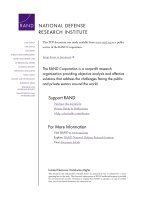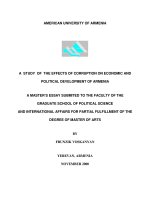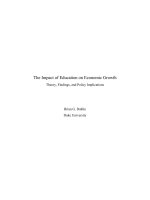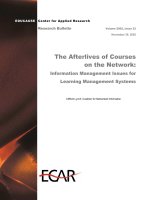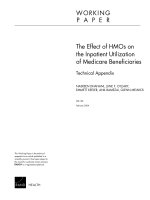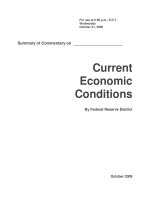- Trang chủ >>
- Tuyển sinh lớp 10 >>
- Toán
Functional Stream Derivatives of Context-Awareness on P2P Networks
Bạn đang xem bản rút gọn của tài liệu. Xem và tải ngay bản đầy đủ của tài liệu tại đây (60.53 KB, 2 trang )
<span class='text_page_counter'>(1)</span><div class='page_container' data-page=1>
<b>Functional Stream Derivatives</b>
<b>of Context-Awareness on P2P Networks</b>
Phan Cong Vinh1, Nguyen Thanh Tung2, Nguyen Van Phuc1,
and Nguyen Hai Thanh2
1 <sub>Department of IT, NTT University, 300A Nguyen Tat Thanh St., Ward 13,</sub>
District 4, HCM City, Vietnam
,
2 <sub>International School, Vietnam National University in Hanoi, 144 Xuan Thuy St.,</sub>
Cau Giay District, Hanoi, Vietnam
<i>{tungnt,thanh.ishn}@isvnu.vn</i>
<b>Abstract. This paper will be both to give an in-depth analysis as well as</b>
to present the new material on the notion of context-awareness process on
P2P networks, an idea that networking can both sense and react
accor-dantly based on external actions. The paper formalizes context-awareness
process using the notion of<i>functional stream derivative, including P2P</i>
networks, context-awareness and the functional stream derivatives of
context-awareness on P2P networks. A brief summary of this approach
is also given.
<b>Keywords: Context-awareness, Context-awareness process, Functional</b>
stream derivative, P2P networks.
<b>1</b>
<b>Introduction</b>
In development of P2P networks, one of the limitations of the current approaches
is that when increasing (fully or partially) the context-awareness of networking,
the semantics and understanding of the context-awareness process become
diffi-cult to capture for the development. As motivation, the context-awareness
pro-cess on P2P networks should be carefully considered under a suitably rigorous
mathematical structure to capture its semantics completely, and then support an
automatic developing process, in particular, and applications of context-aware
networking, generally.
Both initial algebras and final coalgebras are mathematical tools that can
supply abstract representations to aspects of the context-awareness process on
P2P networks. On the one hand, algebras can specify the operators and values.
On the other hand, coalgebras, based on a collection of observers, are considered
in this paper as a useful framework to model and reason about the
context-awareness process on P2P networks. Both initiality and finality give rise to a
basis for the development of context-awareness calculi on P2P networks directly
based on and driven by the specifications. From a programming point of view,
P.C. Vinh et al. (Eds.): ICCASA 2012, LNICST 109, pp. 160–167, 2013.
c
</div>
<span class='text_page_counter'>(2)</span><div class='page_container' data-page=2>
Functional Stream Derivatives of Context-Awareness on P2P Networks 161
this paper provides coalgebraic structures to develop the applications in the area
of context-aware computing on P2P networks.
A coalgebraic structure provides an expressive, powerful and uniform view of
context-awareness, in which the observation of context-awareness processes on
P2P networks plays a central role. The concepts of bisimulation and
homomor-phism of context-awareness are used to compute the context-awareness process
on P2P networks.
<b>2</b>
<b>Outline</b>
The paper is a reference material for readers who already have a basic
under-standing of P2P networks and are now ready to know the novel approach for
formalizing context-awareness process on such P2P networks using coalgebraic
language.
Formalization is presented in a straightforward fashion by discussing in detail
the necessary components and briefly touching on the more advanced
compo-nents. The notion of functional stream derivatives, including justifications needed
in order to achieve the particular results, is also presented.
The rest of this paper is organized as follows: Section 3 briefly describes
re-lated work and existing concepts. P2P networks and context-awareness are the
subjects of Section 4. Section 5 presents functional stream derivatives of
context-awareness. Finally, Section 6 is a brief summary.
<b>3</b>
<b>Related Work and Existing Concepts</b>
In our previous paper [15], we have rigorously approached to the notion of
context-awareness in context-aware systems from which coalgebraic aspects of the
context-awareness emerge. The coalgebraic model is used to formalize the
unify-ing frameworks for context-awareness and evolution of the context-awareness
pro-cesses, respectively.
Most notions and observations of this paper are instances of a theory called
universal coalgebra [10,4]. In [9,11], some recent developments in coalgebra are
presented.
The programming paradigm with functions called functional programming
[1,5,2,3,7] treats computation as the evaluation of mathematical functions.
Func-tional programming emphasizes the evaluation of funcFunc-tional expressions. The
expressions are formed by using functions to combine basic values.
</div>
<!--links-->
